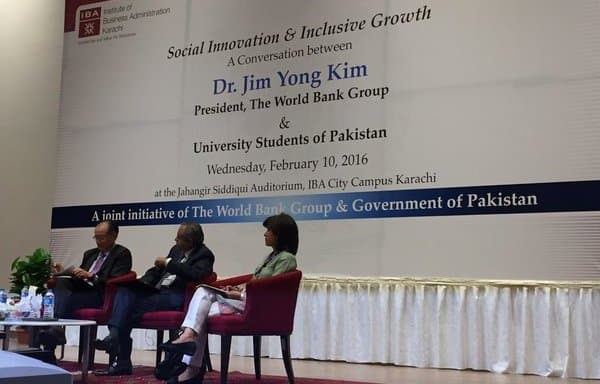KARACHI (APP) – An interaction between Pakistan’s university students and Dr. Jim Yong Kim, President of the World Bank Group, took place Wednesday at the IBA City Campus.
The event was streamed to 75 Pakistani universities and an international audience. This forum was a joint initiative of the World Bank and Government of Pakistan.
Extending a warm welcome to Dr. Jim Yong Kim Dr. Ishrat Husain, the Dean and Director of IBA, stated it was a great pleasure to welcome Dr. Jim at IBA, who decided to interact with the students of Pakistan despite his busy schedule.
He communicated the three factors which IBA has decided to focus on as the oldest business school outside of North America and pointed out that IBA wants to promote upward social mobility and work towards eliminating poverty, reach out to the underprivileged students in remote areas of Pakistan through initiatives like National Talent Hunt Programme, where we groom the students and pay for their tuition fees at IBA and many other universities have now started to model this initiative of ours, which is very fruitful for social development.
He said that the IBA has made it compulsory for its students to do a social internship at social welfare organizations so that the students are exposed to how the underprivileged lead their lives thus sensitizing them to poverty and encouraging them to give back to the society and contribute towards eliminating poverty.
IBA is also focusing on establishing the entrepreneurial spirit among its students and the community at large and for that we have established a Centre for Entrepreneurship at IBA, offering courses to women entrepreneurs, youth entrepreneurs etc.
Dr. Jim Yong Kim is the 12th President of the World Bank, the former President of Dartmouth College-an Ivy League member, ranked amongst Forbes magazine’s list of 100 most influential personalities.
Dr. Kim said as President World Bank, his focus was on eradicating poverty and upliftment of people to fight poverty. He said he believed in evidence based solutions and in order to beat poverty one must learn finance.
The panelist Abdul Razak Dawood, Rector LUMS, stated that in rural sectors people desperately want education for their children and to an extent private sector has done well in establishing affordable schools in rural areas but a lot more needs to be done.
He said 28 million of our youth is between 18-23 years and all of them can not go to universities due to limited resources and thus they should be provided with vocational training and skill development in order to earn satisfactory livelihoods and contribute to the society.
Addressing the audience Sadaf Abid, Co-Founder CIRCLE and former CEO KASHF Foundation, said that the face of wealth is changing worldwide and the new face of wealth is young, self-created and female.
She said today women’s income amounts to $20 trillion globally and for every dollar a woman earns, she invests 90 cents back in to the family so to invest in women is to invest in the society.
Ms. Abid said that globally more women are becoming entrepreneurs and for academic institutions like IBA it is their responsibility to develop cases around women entrepreneurs and teach them to their students to encourage more women entrepreneurs.
She also advised the students to stay resilient and to take part in experiments.
The floor was opened to the students, who asked many questions. Answering students’ questions, Dr. Jim established that the World Bank’s enemy and only competitor was poverty and it is solely focused on combating it.
He said that he wants to change the status quo as a few rich elites control most of the wealth while the bottom 40% of the world’s population live in abject poverty.
He said 45% of children in Pakistan were stunted and that’s a great inequality and he challenged every student present to save Pakistan from stunted individuals as in the next 20 years the global competition will be all about digital dialogue and capabilities and stunted individuals won’t contribute much to our workforce.














